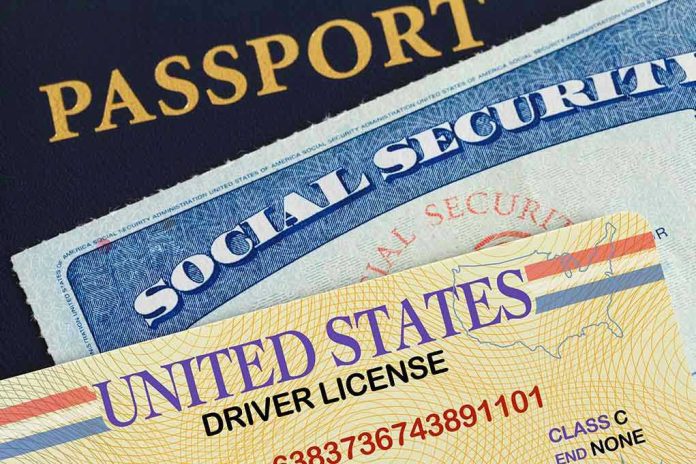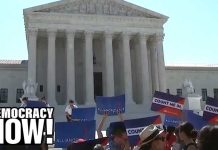
Seventeen thousand commercial drivers in California woke up to find their livelihoods revoked overnight—not by a state they trusted, but by a federal order they never saw coming, upending the delicate balance between state compassion and federal command.
Story Snapshot
- California revoked 17,000 commercial licenses for immigrant drivers after federal emergency orders.
- The move followed high-profile fatal crashes involving non-domiciled drivers with California CDLs.
- Federal authorities demanded stricter compliance, overriding California’s longstanding licensing policy.
- Immediate economic, political, and social fallout ripples through California’s workforce and beyond.
Federal Power Collides with California Policy
California’s Department of Motor Vehicles, long a symbol of the state’s immigrant-inclusive ethos, abruptly announced the mass revocation of 17,000 commercial driver’s licenses. This unprecedented action was not born of state politics but was compelled by the U.S. Department of Transportation, wielding emergency regulatory power after two fatal crashes in August and October 2025. Both incidents involved drivers with California-issued commercial licenses who lacked legal residency, and both became rallying points for federal scrutiny and action.
Within weeks, the Federal Motor Carrier Safety Administration’s audit revealed systemic non-compliance with new federal standards for non-domiciled CDL holders. The Trump administration’s USDOT Secretary, Sean P. Duffy, declared that every non-conforming license “is being revoked,” a move that sent shockwaves through California’s immigrant communities and its commercial trucking sector. While Governor Gavin Newsom protested the motive behind the federal order, California complied, effectively ending its practice of granting commercial licenses to undocumented immigrants overnight.
Fatal Crashes Trigger Federal Crackdown
The dominoes began to fall after two deadly crashes—one on August 12, 2025, in Florida, and another on October 21, 2025, in Southern California. Both involved immigrant drivers who obtained their commercial licenses under California’s lenient policies. These tragedies provided federal officials the pretext they needed to demand sweeping changes, arguing that public safety trumped state discretion. The FMCSA’s investigation confirmed that thousands of non-domiciled drivers no longer met the tightened federal criteria, forcing the state’s hand in mass revocations and halting the issuance of new licenses to this group.
This was not California’s first clash with federal regulators over immigration and licensing, but the scale was staggering. State officials, caught between the twin imperatives of immigrant integration and public safety, faced an ultimatum: comply or risk federal intervention in the entire state licensing apparatus. The swiftness of the crackdown left little room for negotiation, exposing the limits of California’s autonomy under federal supremacy in interstate commerce regulation.
Economic Shockwaves and Political Fallout
Thousands of immigrant drivers—many the sole earners for their families—lost legal access to their livelihoods within days. Trucking companies and logistics firms, already stretched thin by labor shortages, scrambled to adjust schedules and routes. Critics warned of delivery delays and higher costs rippling through California’s supply chains, while supporters of the crackdown insisted that public safety and legal compliance must come first.
"California caves to Trump and yanks 17,000 commercial driving licenses for immigrants" – The Independent #SmartNews https://t.co/yO2j0uoMu7
— Humanist4life (@humanist4l68003) November 13, 2025
Immigrant advocacy groups condemned the move as a targeted assault on vulnerable communities, accusing federal officials of exploiting tragedy for political gain. California lawmakers echoed these concerns, but their legal options proved limited once the federal emergency order took effect. The revocation process moved forward, affecting not just drivers and companies, but entire communities dependent on immigrant labor for economic stability. The episode reignited national debates about the scope of state authority in the face of federal mandates, and whether public safety can ever be fully disentangled from the politics of immigration.
Wider Implications and the Road Ahead
Industry experts predict a period of adjustment as California’s commercial driving workforce contracts and companies adapt to stricter federal oversight. Safety advocates argue that the move was overdue, citing the risk posed by drivers who lacked full legal vetting. Meanwhile, legal scholars point to the federal government’s clear supremacy in commercial vehicle regulation, noting that California’s options for resistance were always limited.
Other states with similar licensing practices now find themselves under the microscope, bracing for possible audits and enforcement actions. The federal-state tug of war over immigration and public safety is far from resolved, but the sheer scale of California’s license revocation sets a new benchmark for what federal intervention can look like. As the dust settles, the affected drivers—and the industries that once relied on them—face an uncertain road ahead, caught between competing visions of law, order, and opportunity.
Sources:
USDOT/Federal Motor Carrier Safety Administration



